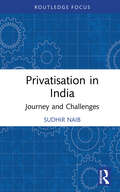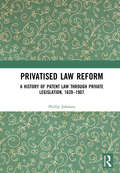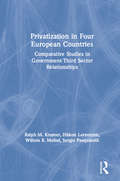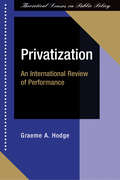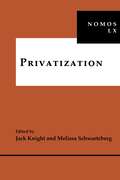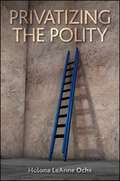- Table View
- List View
Privatisation in India: Journey and Challenges (Routledge Focus on Business and Management)
by Sudhir NaibThis book is a comprehensive work which incisively analyses, from a theoretically informed perspective, crucial aspects of India’s journey from partial divestiture to privatisation, accompanied by case studies of enterprises being privatised in FY 2022. Naib begins with the economic role of the state followed by theoretical and empirical evidence on the state versus private ownership in the first two chapters. Next, an overview of public sector in India including the New Public Sector Enterprise Policy for Atmanirbhar Bharat-2021 is discussed, before a broader examination of the global experience with privatisation is done. Naib then goes on to explore India’s journey from partial divestiture to privatisation from 1991 to 2021 in four time slots based on the political party in power. The book also looks at big ticket privatisation and asset monetisation proposed in FY 2022. Many criticised the design of National Monetisation Plan as it may lead to concentration of wealth, increasing inequalities, asset stripping, and consumers paying higher charges. The book closes by presenting six instances of big-ticket privatisations ranging from airlines, airports, banks, insurance, as well as industries such as petroleum and telecoms. The book’s timely data and analysis of key developments will interest researchers in the fields of divestiture and privatisation in India.
Privatisation in Ireland
by D�nal Palcic Eoin ReevesThis book analyzes privatization in Ireland, a European economy that has experienced rapidly changing fortunes over the last thirty years. It examines the effects of privatization in terms of corporate performance, public finances and the distributional aspects of privatization including the impact on employment and share ownership.
Privatised Law Reform: A History Of Patent Law Through Private Legislation, 1620-1907
by Phillip JohnsonIn the history of British patent law, the role of Parliament is often side-lined. This is largely due to the raft of failed or timid attempts at patent law reform. Yet there was another way of seeking change. By the end of the nineteenth century, private legislation had become a mechanism or testing ground for more general law reforms. The evolution of the law had essentially been privatised and was handled in the committee rooms in Westminster. This is known in relation to many great industrial movements such as the creating of railways, canals and roads, or political movements such as the powers and duties of local authorities, but it has thus far been largely ignored in the development of patent law. This book addresses this shortfall and examines how private legislation played an important role in the birth of modern patent law.
Privatisering in Pakistan: Uitdagingen en respons
by Shahid Hussain RajaZonder technische termen en geschreven in een gemakkelijk te lezen taal, is dit korte boek bedoeld voor algemeen lezerspubliek, met name voor degenen die moeten weten wat er gebeurt is met de privatiserings-inspanningen in Pakistan nadat de Pakistan Muslim League in 2013, een bedrijfsvriendelijk regime, aan de macht kwamen. Dit korte e-book is een uitgebreide versie van mijn artikel "Privatisering in Pakistan" dat ik schreef kort na mijn pensionering als Federaal Secretaris van de regering van Pakistan, ministerie van privatisering in 2012. Het trok veel aandacht, wat me ertoe aanzette een volwaardig boek te schrijven over de geschiedenis van privatisering in Pakistan en andere gerelateerde kwesties, inclusief de vooruitzichten en de uitdagingen waarmee het op korte tot middellange termijn zal geconfronteerd worden. Behoefte aan privatisering Over het algemeen heeft de staat een of meer van de volgende privatiseringsdoelstellingen; 1. versterking van de privé sector. Dit was de drijfveer achter de eerste generatie van privatiseringen die in 1960 in Pakistan werd uitgevoerd, toen de staat fabrieken bouwde in strategische sectoren en deze tegen zeer nominale tarieven overdroeg aan de zakenlieden die terughoudend waren om in deze sectoren te investeren vanwege een gebrek aan vereiste middelen tot hun beschikking en hoge risico's. 2. Verbetering van de efficiëntie en dienstverlening van staatsbedrijven, al dan niet winstgevend, door het stimulerings- en beloningsmechanisme in te voeren van de privé sector die kapitaal, technologie en betere beheerspraktijken zou inbrengen. Pakistan privatiseerde het grootste deel van zijn staatsbedrijven tijdens de privatisering van de tweede generatie in de jaren tachtig en negentig. 3. Elimineren / verminderen van de enorme overheidssubsidies die worden gegeven aan staatsbedrijven die voortdurend verliezen lijden, maar die niet kunnen worden gesloten vanweg
Privatising the Public University: The Case Of Law
by Margaret ThorntonFirst Published in 2011. Routledge is an imprint of Taylor & Francis, an informa company.
Privatización en Pakistán
by Shahid Hussain RajaAunque Pakistán haya estado llevando a cabo la privatización de empresas estatales por más de 50 años, la privatización de cualquier empresa siempre genera discusiones acaloradas, normalmente centradas alrededor de cuatro problemas/necesidades y beneficios, intereses de los empleados, bienestar del consumidor y transparencia. Mientras que sus autores lo apoyan por reducir subsidios estatales y lograr ganancias por eficiencia, sus adversarios se oponen por sacrificar bienestar público, “vender la plata familiar” (deshacerse de algo valioso en búsqueda de una ventaja, a pesar de que sea conveniente resguardarlo), y crear monopolios privados. Incluso aquellos, que son no partidistas en este debate, aconsejan precaución y argumentan que este proceso debería ser estrictamente evitado en el caso de monopolios naturales y de activos estratégicos como recursos naturales. Dejando de lado el debate, el hecho que la privatización es una parte integrante de la agenda general de la liberación y desregulación económica. Abriendo la economía a la competición, la liberación económica puede remover ineficiencias estructurales y falsas barreras creadas por el estado a la competencia. Eso es lo que se necesita y está pasando en Pakistán ahora. Este corto Libro digital es una versión ampliada de mi artículo “Privatización en Pakistán”, el cual escribí poco después de mi jubilación como secretario federal del Gobierno de Pakistán, Ministerio de Privatización en 2012. Atrajo un montón de atención y me impulsó a escribir un libro de pleno derecho sobre la historia de la privatización en Pakistán y otros problemas relacionados incluyendo sus porvenires y los desafíos que iba a enfrentar en el corto a mediano plazo.
Privatization In Bangladesh: Economic Transition In A Poor Country
by Clare E HumphreyBangladesh, the world's poorest large country, has privatized more state-owned industries than any other developing nation. This policy-orientated study traces Bangladesh's economic fortunes in its British, Pakistani and independent periods. Around the theme of a traditional society coping with modernization, the study analyzes in depth the effects
Privatization and Public Enterprises
by Richard Hemming Ali M. MansoorA report from the International Monetary Fund.
Privatization in Four European Countries: Comparative Studies in Government - Third Sector Relationships
by Ralph M. KramerThis book has a dual focus: on how four countries use voluntary non-profit organizations to provide services to the physically, mentally, and sensorially handicapped; and on the changing role of the voluntary, or "third," sector in welfare states. At the same time, it is also a comparative study of privatization in the special sense of using nongovernmental organizations to implement public policy. Most comparative studies of the welfare state have neglected this form of "indirect public administration" because researchers have usually conceived of government as monolithic and consequently overlook the frequent separation of financing from the delivery of public services.
Privatization in Malaysia: Regulation, Rent-Seeking and Policy Failure (Routledge Malaysian Studies Series)
by Jeff TanIn recent years, privatisation has fallen out of favour in many countries because the underlying political factors have not been well understood. This book examines Malaysia’s privatisation programme, focusing on how political constraints resulted in the failure of four major privatisations: the national sewerage company (IWK), Kuala Lumpur Light Rail Transit (LRT), national airline (MAS), and national car company (Proton). It considers why developing countries such as Malaysia might want to embark on privatisation, the factors that lead to policy failure, and what is needed to make it work. It shows clearly that political motives driving privatisation often dominate purely economic considerations, and thus it is necessary to analyse privatisation within the specific country context. It argues that failure in the Malaysian case was due to political considerations that compromised institutional design and regulatory enforcement, leading to problems associated with corruption. It concludes that privatisation does not necessarily improve incentives for efficiency or enhance the finance available for capital investment, and that successful privatisation depends on the state’s institutional and political capacity to design and manage an appropriate set of subsidies. Overall, this book is a comprehensive examination of privatisation in Malaysia, providing important insights for understanding the political economy of this process in other developing countries.
Privatization in Transition Countries
by Donal Mcgettigan Oleh HavrylyshynThe authors' view is that any privatisation is better than none, regardless of whether a stable, competitive environment has been established first. However, private companies started from scratch perform best, followed by newly privatised firms run by outsiders, either local or foreign. Privatised companies dominated by insiders do less well, but even they regularly outperform state enterprises. Without an appropriate market environment though, managers may spend more time lobbying the government for support than undertaking painful restructuring measures.
Privatization of Early Childhood Education and Care in Nordic Countries (Palgrave Studies in Third Sector Research)
by Karl Henrik Sivesind Håkon Solbu Trætteberg Maiju Paananen Steinunn HrafnsdóttirThis book explores the increasing role of private providers in early childhood education and care (ECEC) as they become a core part of the Nordic welfare model—one that once rejected for-profit involvement in public welfare. Within this context, ECEC has become the key battleground over private providers’ role in the welfare system. Chapters compare five Nordic countries: Iceland, Finland, Denmark, Sweden, and Norway, to discuss possible benefits from having different types of providers—public, nonprofit, and for-profit—in the welfare mix. To conclude, the authors also provide a comparative perspective on governance of the ECEC sector and on the development and functions of the Nordic welfare model.
Privatization: An International Review Of Performance
by Graeme HodgeContracting out public sector services and divesting public enterprises are reforms that have enjoyed widespread global popularity in recent years. Better services, lower prices and greater accountability are the promises made by politicians, senior executives, and investment companies when functions are moved from the public sector to private enterprise. But in Privatization, Graeme A. Hodge challenges these assumptions. Through an examination of hundreds of international studies on the performance of privatization activities, Hodge demonstrates that privatizing public services is often not the guaranteed panacea portrayed by its political supporters. Importantly, privatization activities can lead to modest gains, but there are also winners and losers in this reform. It therefore deserves far more care and balanced debate than it usually attracts.
Privatization: NOMOS LX (NOMOS - American Society for Political and Legal Philosophy #29)
by Melissa SchwartzbergA distinguished group of scholars explore the moral values and political consequences of privatization The 21st century has seen a proliferation of privatization across industries in the United States, from security and the military to public transportation and infrastructure. In shifting control from the state to private actors, do we weaken or strengthen structures of governance? Do state-owned enterprises promise to be more equal and fair than their privately-owned rivals? What role can accountability measures play in mediating the effects of privatization; and what role does coercion play in the state governance and control? In this latest installment from the NOMOS series, an interdisciplinary group of distinguished scholars in political science, law, and philosophy examine the moral and political consequences of transferring state-provided or state-owned goods and services to the private sector. The essays consider how we should evaluate the decision to privatize, both with respect to the quality of outcomes that might be produced, and in terms of the effects of privatization on the core values underlying democratic decision-making. Privatization also affects the structure of governance in a variety of important ways, and these essays evaluate the consequences of privatization on the state. Privatization sheds new light on these highly salient questions of contemporary political life and institutional design.
Privatização no Paquistão: desafios e resposta
by Shahid Hussain Raja Gisely GanozaEste pequeno EBook é uma versão expandida do meu artigo "Privatização no Paquistão", que eu escrevi logo depois da minha aposentadoria como Secretário Federal do Governo do Paquistão, Ministério da Privatização em 2012. Sua publicação atraiu muita atenção, me pedindo que escrevesse um documento completo, um livro sobre a história da privatização no Paquistão e outras questões relacionadas, incluindo suas perspectivas e os desafios que enfrentará em curto e médio prazo. Desprovido de termos técnicos e escrito em um idioma fácil de ler, este pequeno livro é para leitores em geral, particularmente para aqueles que precisam saber o que está acontecendo com os esforços de privatização do Paquistão depois de entrar no poder um regime favorável às empresas, a Liga Muçulmana do Paquistão, em 2013.
Privatizing China: Socialism from Afar
by Aihwa Ong Li ZhangEveryday life in China is increasingly shaped by a novel mix of neoliberal and socialist elements, of individual choices and state objectives. This combination of self-determination and socialism from afar has incited profound changes in the ways individuals think and act in different spheres of society. Covering a vast range of daily life--from homeowner organizations and the users of Internet cafes to self-directed professionals and informed consumers--the essays in Privatizing China create a compelling picture of the burgeoning awareness of self-governing within the postsocialist context. The introduction by Aihwa Ong and Li Zhang presents assemblage as a concept for studying China as a unique postsocialist society created through interactions with global forms. The authors conduct their ethnographic fieldwork in a spectrum of domains--family, community, real estate, business, taxation, politics, labor, health, professions, religion, and consumption--that are infiltrated by new techniques of the self and yet also regulated by broader socialist norms. Privatizing China gives readers a grounded, fine-grained intimacy with the variety and complexity of everyday conduct in China's turbulent transformation.
Privatizing Malaysia: Rents, Rhetoric, Realities
by Jomo K SIn this first critical, multidisciplinary assessment of recent privatization in a developing country, the contributors offer valuable lessons for the comparative study of denationalization and related public policy options. After an introductory survey, the volume presents broad perspectives on the context, formulation, and adjustment of privatization policy in Malaysia. The contributors review the distributional implications of specific privatizations for the public interest as well as for consumer and employee welfare. The book concludes with an examination of the economic, political, and cultural impacts of the privatization of physical infrastructure, telecommunications, and television programming.
Privatizing Poland: Baby Food, Big Business and the Remaking of Labor
by Elizabeth C. DunnThis book examines the effects privatization has on workers' self-concepts; how changes in "person-hood" relate to economic and political transitions; and how globalization and foreign capital investment affect Eastern Europe's integration into the world economy.
Privatizing Poland: Baby Food, Big Business, and the Remaking of Labor
by Elizabeth C. DunnThe transition from socialism in Eastern Europe is not an isolated event, but part of a larger shift in world capitalism: the transition from Fordism to flexible (or neoliberal) capitalism. Using a blend of ethnography and economic geography, Elizabeth C. Dunn shows how management technologies like niche marketing, accounting, audit, and standardization make up flexible capitalism's unique form of labor discipline. This new form of management constitutes some workers as self-auditing, self-regulating actors who are disembedded from a social context while defining others as too entwined in social relations and unable to self-manage. Privatizing Poland examines the effects privatization has on workers' self-concepts; how changes in "personhood" relate to economic and political transitions; and how globalization and foreign capital investment affect Eastern Europe's integration into the world economy. Dunn investigates these topics through a study of workers and changing management techniques at the Alima-Gerber factory in Rzeszów, Poland, formerly a state-owned enterprise, which was privatized by the Gerber Products Company of Fremont, Michigan. Alima-Gerber instituted rigid quality control, job evaluation, and training methods, and developed sophisticated distribution techniques. The core principle underlying these goals and strategies, the author finds, is the belief that in order to produce goods for a capitalist market, workers for a capitalist enterprise must also be produced. Working side-by-side with Alima-Gerber employees, Dunn saw firsthand how the new techniques attempted to change not only the organization of production, but also the workers' identities. Her seamless, engaging narrative shows how the employees resisted, redefined, and negotiated work processes for themselves.
Privatizing War: A Moral Theory (War, Conflict and Ethics)
by William FeldmanThis book offers a comprehensive moral theory of privatization in war. It examines the kind of wars that private actors might wage separate from the state and the kind of wars that private actors might wage as functionaries of the state. The first type of war serves to probe the ad bellum question of whether private actors can justifiably authorize war, while the second type of war serves to probe the in bello question of whether private actors can justifiably participate in war. The cases that drive the analysis are drawn from the rich and complicated history of private military action, stretching back centuries to the Italian city-states whose mercenaries were reviled by Machiavelli. The book also takes up the hypothetical examples conjured by philosophers—the private protective agencies of Robert Nozick’s Anarchy, State, and Utopia, for example, and the private armies of Thomas More’s Utopia. The aim of this book is to propose a theory of privatization that retains currency not only in assessing current military engagements, but past and future ones as well. In doing so, it also raises a set of important questions about the very enterprise of war. This book will be of much interest to students of ethics, political philosophy, military studies, international relations, war and conflict studies, and security studies.
Privatizing the Democratic Peace
by Henry F. CareyNGOs have become one of the main instruments in building peace, especially as UN sanctioned peacekeeping missions begin to streamline or are tranformed into formal peacebuilding missions, and as bilateral consensual or unilaterally imposed peacekeeping, like the US in Iraq and Russia in Georgia, endure for decades. During the past three decades, the UN has relied more and more on NGOs and sub-contractors in peacebuilding. The greater the number of multi-dimensional challenges and dilemmas that emerge for these NGOs, the more the sponsoring governments and intergovernmental organizations and host states are directly affected by these transitional efforts. Henry F. Carey analyzes the difficult choices, consequences and lessons learned from the UN and foreign governments commissioning NGOs and other subcontractors working on six peacebuilding policy goals: reconciliation, security, human rights, the rule of law, foreign aid, and election monitoring. The study examines the effects of the UN and powerful states increasingly relying on NGO peacebuilding in diverse cases like Bosnia, El Salvador, Nicaragua, Haiti, Liberia, Rwanda, Sierra Leone, Sudan, the Philippines, Chechnya, Iraq, Pakistan, and Afghanistan.
Privatizing the Polity
by Holona LeAnne OchsResearch on poverty and research on governance currently exist as largely disparate literatures without a framework for building knowledge regarding how policies and practices compare as poverty alleviation strategies. In Privatizing the Polity, Holona LeAnne Ochs examines the evolution of the governance of welfare programs across the United States. Throughout the political spectrum the trend in recent decades has been towards welfare privatization, shifting the boundaries of poverty governance from public to private actors—whether they are foundations or social entrepreneurs—whose interests in poverty governance are more obscure. The analysis of more than eighteen years of data suggests that strategies of devolution and privatization make it more difficult for people to move out of poverty. At the same time the framework for understanding the governance structures, enactment practices, and social wealth leverage presented in Privatizing the Polity offers numerous opportunities for acquiring a deeper understanding of assumptions formerly taken for granted and redirecting the system to enhance poverty alleviation.
Privatizing the Public University: Perspectives from across the Academy
by Christopher C. Morphew, Peter D. EckelWith public colleges and universities facing substantial budget cuts and increased calls for accountability, more institutions now rely on private revenue streams for support. As market-driven policies and behaviors become more commonplace, some cautious critics sound the alarm, while others watching the bottom line cheer. But which perspective gets it right? Does the privatization of public higher education threaten its very mission or support it?In this collection of essays, economists, policy makers, political scientists, sociologists, and organizational researchers discuss the impact of privatization from their respective disciplinary perspectives and assess its implications for the future of higher education. Privatization may bring additional funds and services that are free from government regulations and oversight, but does it also allow private interests to have undue influence over public higher education? Should public universities have to compete in the economic marketplace as vigorously as they do in the marketplace of ideas? What are the implications when institutions of higher learning function like businesses? With privatization now a reality for most public colleges and universities, an objective examination of the issue from these diverse academic perspectives will be welcomed by those struggling with its challenges.
Privilege
by Guinevere Glasfurd'Tightly plotted and hugely readable' Jane Rogers, author of PROMISED LANDS'Marvellous . . . fans of immersive historical fiction, the 18th century, all things French and a dash of peril, this one's for you' Emily Brand, author of THE FALL OF THE HOUSE OF BYRON'Glasfurd deftly, elegantly captures this volatile world of impoverished attic rooms and gilded literary salons' DAILY MAIL'I thought of the books we carried and the hands that would one day hold them. The pages read, turned and discussed. And how the book would become thought and the thought then become the person gone out into the world. Let Gilbert try and put a stop to that.'After her father is disgraced, Delphine Vimond is cast out of her home in Rouen and flees to Paris. Into her life tumbles Chancery Smith, apprentice printer sent from London to discover the mysterious author of potentially incendiary papers marked only D. In a battle of wits with the French censor, Henri Gilbert, Delphine and Chancery set off in a frantic search for D's author. But who is D and does D even exist?Privilege is a story of adventure and mishap set against the turmoil of mid-18th century France at odds with the absolute power of the King who is determined to suppress opposition on pain of death. At a time when books required royal privilege before they could be published - a system enforced by the Chief Censor and a network of spies - many were censored or banned, and their authors harshly punished. Books that fell foul of the system were published outside France and smuggled back in at great risk.Costa-shortlisted author Guinevere Glasfurd has conjured a vibrant world of entitlement and danger, where the right to live and think freely could come at the highest cost.
Privilege
by Guinevere Glasfurd18th century France - a world of fountains and gilded porcelain, literary salons and spies... where the right to live and think freely could cost you your life....I thought of the books we carried and the hands that would one day hold them. The pages read, turned and discussed. The book returned to the shelf, taken down to be read again. The book become thought and the thought become the person and the person gone out into the world. Let Gilbert try and put a stop to that...Privilege is set in the 18th century France of an Enlightenment at odds with the absolute power of the King determined to suppress opposition on pain of death.Delphine Vimond flees to Paris after being cast out from her home in Rouen when her father is disgraced. Into her life tumbles Chancery Smith, apprentice printer from London, sent to discover the mysterious author of potentially seditious papers marked only D.In a battle of wits with the French censor, Henri Gilbert, Delphine and Chancery set off in a frantic search for D's author. But who is he - and does he even exist?A novel in defence of reason, humanism and hope.(P) 2022 Hodder & Stoughton Limited
